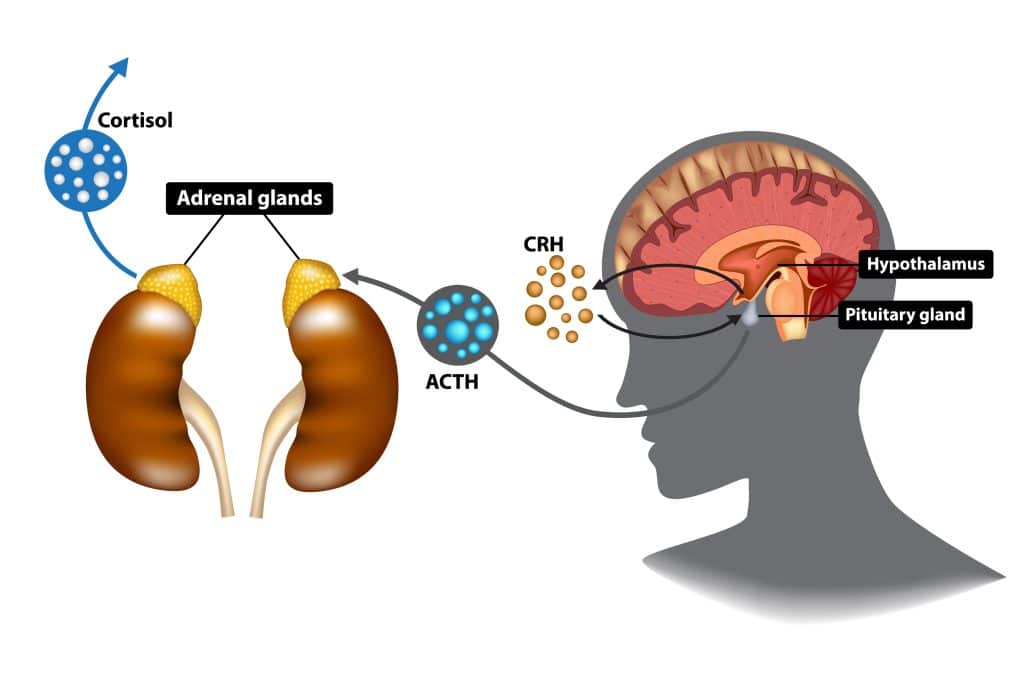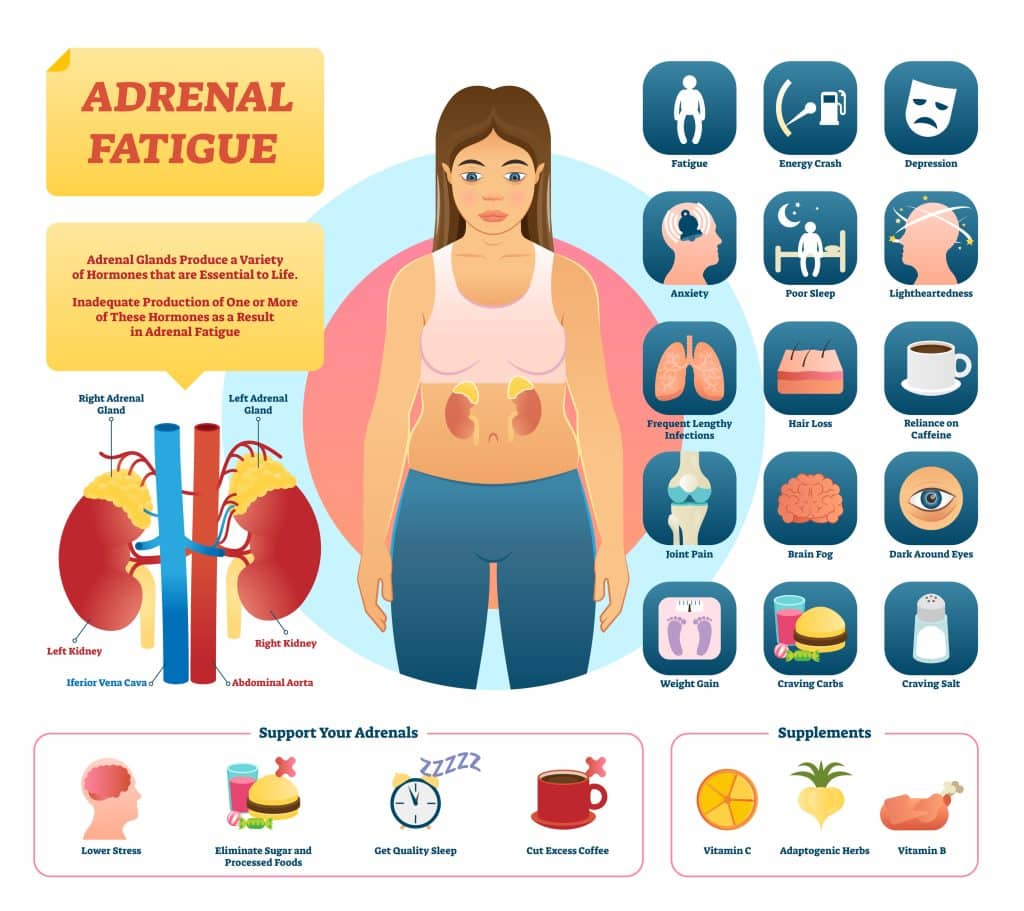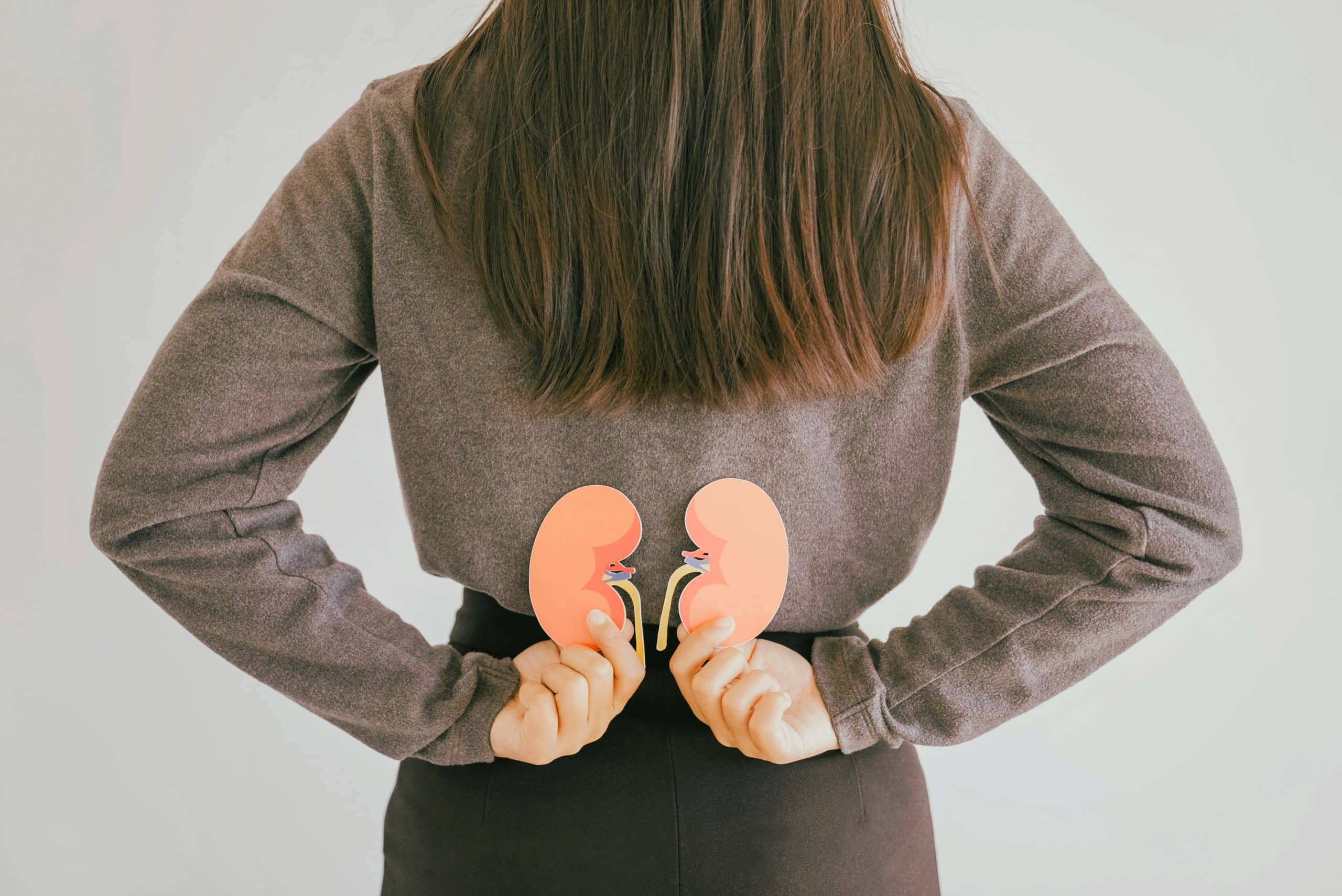What Causes Adrenal Fatigue – And How To Regain Normal Adrenal Function
Exactly what causes adrenal fatigue is a complicated subject as many factors are at play. However, simply put, adrenal fatigue is a condition where the adrenal glands do not produce enough of the hormones necessary for optimal functioning. This can lead to a variety of symptoms, including difficulty concentrating, low energy levels, anxiety, insomnia, and even depression.1
What Causes Adrenal Fatigue – Upstream Factors
When the adrenal glands become exhausted, they can no longer produce the necessary hormones to regulate basic body functions. Adrenal fatigue has been associated with stress, poor diet, lack of exercise, and other lifestyle factors. Additionally, there are many upstream factors that contribute to the development of adrenal fatigue.
Upstream Factors That Cause Adrenal Fatigue – HPA Axis Malfunction
Adrenal fatigue is often caused by an imbalance in the body’s hypothalamic-pituitary adrenal (HPA) axis. The HPA axis is responsible for regulating hormones and other bodily functions such as stress, sleep, digestion, mood, and energy levels. When this system is disturbed due to long-term or acute stressors like trauma, chronic fatigue syndrome, or toxins, it can lead to an array of symptoms such as exhaustion despite sleeping well, difficulty concentrating or getting things done, low energy levels and a general feeling of malaise.2
Upstream effects of HPA axis malfunction include the release of stress hormones like cortisol and adrenaline which cause a fight-or-flight response in the body. This can lead to a decrease in libido, depression, anxiety, digestive issues such as bloating and abdominal pain, headaches, joint pain, sleep disturbances like insomnia or too much sleepiness, and an intolerance to foods that were once easily digested.3

What Causes Adrenal Fatigue – Heavy Metals
Heavy metal toxicity is a serious health concern that can lead to a wide range of symptoms. One of the most concerning effects of heavy metal accumulation is adrenal fatigue, which occurs when toxins build up in the hypothalamus and disrupt its ability to regulate stress hormones. Exposure to high levels of mercury, arsenic, aluminum, and other metals has been linked to an increased risk of developing adrenal fatigue, and long-term accumulation can significantly impact a person’s health.4
The hypothalamus is an important part of the endocrine system, and its primary function is to regulate hormone production. When heavy metals accumulate in the hypothalamus, they disrupt the ability of the hormones to work effectively. This can lead to increased levels of cortisol, the stress hormone, and a decrease in other hormones such as testosterone.5
Read more about heavy metal toxicity.
What Causes Adrenal Fatigue – EDCs
One of the factors that affect the HPA is the presence of an endocrine-disrupting chemical (EDC). EDCs are chemicals, such as pesticides and industrial solvents, that interfere with normal hormonal processes. These chemicals can disrupt hormones responsible for growth and development, metabolism, reproduction, and other body functions.6
What Causes Adrenal Fatigue – Chronic Inflammation
Another upstream factor that can contribute to adrenal fatigue is chronic inflammation. Inflammation can be caused by a variety of factors, including exposure to toxins, stress, and a compromised immune system. This chronic inflammation triggers the body’s inflammatory response, which can cause the adrenal glands to become overworked and eventually lead to adrenal fatigue.7
Read more about chronic inflammation.

What Causes Adrenal Fatigue – Nutritional Deficiencies
Nutritional deficiencies are also often linked with the development of adrenal fatigue. Nutrients such as zinc, Vitamin C, Vitamin B5, and magnesium are particularly important for maintaining healthy adrenal function. If you’re not getting enough of these vital nutrients in your diet, it can lead to an imbalance in hormones and eventually cause adrenal fatigue.8
What Causes Adrenal Fatigue – Inadequate Sleep
Inadequate sleep is another factor that can contribute to adrenal fatigue. Poor sleep can lead to an increase in the body’s stress response, and cause the adrenal glands to become overworked. Not getting enough restorative sleep can throw off your body’s hormone production, leaving you feeling exhausted and depleted throughout the day.9
What Causes Adrenal Fatigue – Stress
One of the main causes of adrenal fatigue is chronic stress. Stress can come from external sources, such as a difficult job or relationship, but it can also come from internal sources like worry and self-criticism. Studies have shown that chronic stress has an adverse effect on the body’s fight or flight response, leading to the body feeling overwhelmed and exhausted.10
What Causes Adrenal Fatigue – High Dietary Sugar Consumption
Diet plays a large role in the development of adrenal fatigue. One major dietary factor that has been linked to the onset of adrenal fatigue is the consumption of high amounts of sugar. Excessive sugar consumption can put an extra strain on the adrenal glands. As a result, the adrenal glands can become overrun and lead to adrenal fatigue.
In addition to creating an imbalance in hormones, eating too much sugar also disrupts healthy sleep patterns. Eating sugary foods should be avoided close to bedtime because it can keep us alert and prevent deep sleep. Without proper rest, the adrenal glands struggle to recover from the day’s work.
In order to minimize the risk of developing adrenal fatigue, it is important to reduce your intake of sugary foods and beverages. Cutting out added sugars from your diet or reducing your overall caloric intake may help alleviate symptoms associated with this condition.11
Read more about how toxic sugar is.

What Causes Adrenal Fatigue – High Caffeine And Stimulant Consumption
Caffeine and other stimulants trigger the release of hormones like adrenaline which can lead to adrenal exhaustion if taken in large amounts over time. This can result in feeling stressed out, anxious, fatigued, and having difficulty focusing.
Research has shown that high caffeine and stimulant consumption can cause a disturbance in the body’s adrenal system, leading to an imbalance in hormone levels. This causes the body to become overly dependent on these hormones for energy and can eventually lead to adrenal fatigue.12
Diagnosing Adrenal Fatigue With Blood Pressure Changes
Orthostatic hypotension (OH) is associated with adrenal fatigue. This condition, also known as postural hypotension, is caused by a decrease in blood pressure when you stand up from sitting or lying down. It occurs because your body isn’t able to maintain your normal blood pressure levels. OH can make you feel dizzy, lightheaded, and weak when standing up.
A person with healthy adrenal glands should be able to move from a lying position to a standing position quickly without becoming dizzy or light-headed. In healthy individuals, systolic blood pressure is lower when lying down and will rise between 10 and 15 points upon standing. However, people with adrenal fatigue generally have a lower systolic blood pressure upon standing.13
Diagnosing Adrenal Fatigue With The Pupillary Light Response Test
The second non-invasive way to test for adrenal fatigue is the pupillary light response test (PLR). PLR tests are used by doctors to diagnose a variety of conditions, including adrenal fatigue.
This test is basically done by shining a bright light into the eyes and measuring the reaction of the pupils. Normally, when shone with light, our pupils will react quickly by contracting. However, in people suffering from adrenal fatigue, this contraction may not be as quick or intense as expected. The PLR test can provide an objective measure of fatigue levels through the evaluation of the pupil response.
To perform this test you’ll need a flashlight or other light source, and a timer. Begin by turning off the lights in the room and looking straight ahead with both eyes open. Shine the light directly at your pupil for about 4 seconds, then quickly look away from it. Time how long it takes for your pupil to return to its normal size (5-10 seconds is considered normal). If your pupils take more than 10 seconds to return to their normal size, this could be an indication of adrenal fatigue. Additionally, if the pupils appear to be pulsating back and forth between dilated and contracted, this is also an indication of adrenal fatigue.14

Diagnosing Adrenal Fatigue By Determining Vitamin C Carrying Capacity
Vitamin C is essential for the functioning of the adrenal glands, as it helps to regulate the production of cortisol, the hormone responsible for regulating many body functions including heart rate and blood pressure.
Diagnosing adrenal fatigue through vitamin C carrying capacity is another way to gauge the function of the adrenals. In this test, high doses of vitamin C are consumed. Individuals who are able to consume large doses of vitamin C without suffering from diarrhea often have adrenal issues. However, healthy individuals are typically unable to consume extremely high doses of vitamin C without diarrhea symptoms.15 16
Diagnosing Adrenal Fatigue – Constipation
2 to 3 bowel movements a day is considered normal. Of course, this number can vary depending on the individual, but generally, that is a good range to aim for. It’s also important to note that healthy bowel movements should be easy to pass and not accompanied by pain or discomfort. If you find yourself having irregular bowel movements, it may be a sign of an unbalanced adrenal system.
Constipation is one of the most common symptoms of adrenal fatigue. It can lead to abdominal pain, bloating, and difficulty passing stools. For people with adrenal fatigue, constipation is often due to insufficient levels of cortisol and other hormones produced by the adrenals.17
What Causes Adrenal Fatigue – And How To Regain Normal Adrenal Function
The first step to regaining normal functioning of the adrenals is to remove any toxic load that may be present in your body. This can involve removing heavy metals from the body, eating an organic, whole-foods diet, while avoiding environmental toxins like smog and air fresheners.
Read more about common toxins we are exposed to.
It is also important to get enough sleep and rest so that the adrenals can properly recuperate, as well as to manage your stress levels by exercising regularly and incorporating relaxation techniques into your daily routine.
In addition, it is important to repair the HPA axis, which is a part of the body that controls the production and regulation of hormones in response to stress. By improving the function of upstream factors that dictate adrenal function, we can often target the source of the problem and remedy the downstream symptoms, like adrenal fatigue.

Regain Normal Adrenal Function – Seriphos, DHEA, Pregnenolone
While the initial focus is on removing the factors that are causing adrenal fatigue, some supplements such as Seriphos, pregnenolone, and DHEA can be beneficial for those suffering from adrenal fatigue.
Seriphos is an herbal formula that helps to support adrenal health which contains Phosphatidylserine (PS), a phospholipid found in the brain which is important for memory and cognitive function.18
Pregnenolone is a hormone that helps to regulate the body’s metabolism and energy levels. It can help to improve mood, cognitive function, and overall well-being. When adrenal fatigue sets in, the body produces less pregnenolone than it should, which can cause further fatigue and other symptoms. Taking pregnenolone supplements can replenish this hormone, as well as reduce stress and improve cognitive function.
In addition to boosting energy levels, pregnenolone can also help with other conditions related to adrenal fatigue. It has been found to have positive effects on the immune system, helping to reduce inflammation and protect against infections. Pregnenolone is also thought to be helpful in reducing anxiety and depression, which can often be caused by adrenal fatigue. Taking pregnenolone has been found to have positive effects on reducing cortisol levels and helping to balance hormones.19
One of the most popular remedies for adrenal fatigue is DHEA (dehydroepiandrosterone). It is a hormone produced naturally by our body, and it plays an important role in regulating our stress levels. However, if we are under prolonged periods of stress, then our body’s natural production of DHEA can become depleted. Taking supplemental DHEA can help restore the balance of hormones in the body.20
Read more about autoimmune conditions.
References
1 Adrenal fatigue: What causes it? (2022) Mayo Clinic. Available at: https://www.mayoclinic.org/diseases-conditions/addisons-disease/expert-answers/adrenal-fatigue/faq-20057906 (Accessed: 04 September 2023).
2 Tomas C, Newton J, Watson S. A review of hypothalamic-pituitary-adrenal axis function in chronic fatigue syndrome. ISRN Neurosci. 2013 Sep 30;2013:784520. doi: 10.1155/2013/784520. PMID: 24959566; PMCID: PMC4045534.
3 Spencer RL, Deak T. A users guide to HPA axis research. Physiol Behav. 2017 Sep 1;178:43-65. doi: 10.1016/j.physbeh.2016.11.014. Epub 2016 Nov 18. PMID: 27871862; PMCID: PMC5451309.
4 Rana SV. Perspectives in endocrine toxicity of heavy metals–a review. Biol Trace Elem Res. 2014 Jul;160(1):1-14. doi: 10.1007/s12011-014-0023-7. Epub 2014 Jun 6. PMID: 24898714.
5 Lachowicz JI, Lecca LI, Meloni F, Campagna M. Metals and Metal-Nanoparticles in Human Pathologies: From Exposure to Therapy. Molecules. 2021 Nov 2;26(21):6639. doi: 10.3390/molecules26216639. PMID: 34771058; PMCID: PMC8587420.
6 Di Criscio M, Lodahl JE, Stamatakis A, Kitraki E, Bakoyiannis I, Repouskou A, Bornehag CG, Gennings C, Lupu D, Rüegg J. A human-relevant mixture of endocrine disrupting chemicals induces changes in hippocampal DNA methylation correlating with hyperactive behavior in male mice. Chemosphere. 2023 Feb;313:137633. doi: 10.1016/j.chemosphere.2022.137633. Epub 2022 Dec 21. PMID: 36565761.
7 Hannibal KE, Bishop MD. Chronic stress, cortisol dysfunction, and pain: a psychoneuroendocrine rationale for stress management in pain rehabilitation. Phys Ther. 2014 Dec;94(12):1816-25. doi: 10.2522/ptj.20130597. Epub 2014 Jul 17. PMID: 25035267; PMCID: PMC4263906.
8 Tardy AL, Pouteau E, Marquez D, Yilmaz C, Scholey A. Vitamins and Minerals for Energy, Fatigue and Cognition: A Narrative Review of the Biochemical and Clinical Evidence. Nutrients. 2020 Jan 16;12(1):228. doi: 10.3390/nu12010228. PMID: 31963141; PMCID: PMC7019700.
9 Nicolaides NC, Vgontzas AN, Kritikou I, et al. HPA Axis and Sleep. [Updated 2020 Nov 24]. In: Feingold KR, Anawalt B, Blackman MR, et al., editors. Endotext [Internet]. South Dartmouth (MA): MDText.com, Inc.; 2000-. Available from: https://www.ncbi.nlm.nih.gov/books/NBK279071/
10 Goldstein DS. Adrenal responses to stress. Cell Mol Neurobiol. 2010 Nov;30(8):1433-40. doi: 10.1007/s10571-010-9606-9. PMID: 21061156; PMCID: PMC3056281.
11 Nestler JE, McClanahan MA. Diabetes and adrenal disease. Baillieres Clin Endocrinol Metab. 1992 Oct;6(4):829-47. doi: 10.1016/s0950-351x(05)80169-7. PMID: 1445172.
12 Lovallo WR, Whitsett TL, al’Absi M, Sung BH, Vincent AS, Wilson MF. Caffeine stimulation of cortisol secretion across the waking hours in relation to caffeine intake levels. Psychosom Med. 2005 Sep-Oct;67(5):734-9. doi: 10.1097/01.psy.0000181270.20036.06. PMID: 16204431; PMCID: PMC2257922.
13 Papierska L, Rabijewski M. Delay in diagnosis of adrenal insufficiency is a frequent cause of adrenal crisis. Int J Endocrinol. 2013;2013:482370. doi: 10.1155/2013/482370. Epub 2013 Jun 24. PMID: 23864857; PMCID: PMC3707239.
14 Hannibal KE, Bishop MD. Chronic stress, cortisol dysfunction, and pain: a psychoneuroendocrine rationale for stress management in pain rehabilitation. Phys Ther. 2014 Dec;94(12):1816-25. doi: 10.2522/ptj.20130597. Epub 2014 Jul 17. PMID: 25035267; PMCID: PMC4263906.
15 Padayatty SJ, Doppman JL, Chang R, Wang Y, Gill J, Papanicolaou DA, Levine M. Human adrenal glands secrete vitamin C in response to adrenocorticotrophic hormone. Am J Clin Nutr. 2007 Jul;86(1):145-9. doi: 10.1093/ajcn/86.1.145. PMID: 17616774.
16 Fries E, Hesse J, Hellhammer J, Hellhammer DH. A new view on hypocortisolism. Psychoneuroendocrinology. 2005 Nov;30(10):1010-6. doi: 10.1016/j.psyneuen.2005.04.006. PMID: 15950390.
17 Quénéhervé, L., Drui, D., Blin, J. et al. Digestive symptoms in daily life of chronic adrenal insufficiency patients are similar to irritable bowel syndrome symptoms. Sci Rep 11, 8077 (2021). https://doi.org/10.1038/s41598-021-87158-2
18 Monteleone P, Maj M, Beinat L, Natale M, Kemali D. Blunting by chronic phosphatidylserine administration of the stress-induced activation of the hypothalamo-pituitary-adrenal axis in healthy men. Eur J Clin Pharmacol. 1992;42(4):385-8. doi: 10.1007/BF00280123. PMID: 1325348.
19 Murugan S, Jakka P, Namani S, Mujumdar V, Radhakrishnan G. The neurosteroid pregnenolone promotes degradation of key proteins in the innate immune signaling to suppress inflammation. J Biol Chem. 2019 Mar 22;294(12):4596-4607. doi: 10.1074/jbc.RA118.005543. Epub 2019 Jan 15. PMID: 30647133; PMCID: PMC6433066.
20 Himmel PB, Seligman TM. A pilot study employing Dehydroepiandrosterone (DHEA) in the treatment of chronic fatigue syndrome. J Clin Rheumatol. 1999 Apr;5(2):56-9. doi: 10.1097/00124743-199904000-00004. PMID: 19078357.




